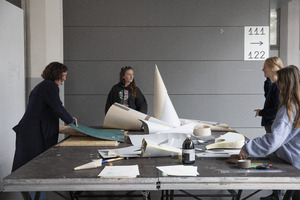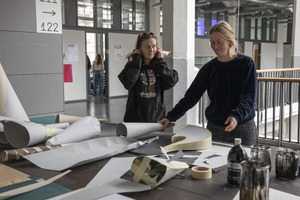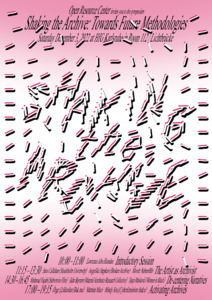"Symposium"
| Begriff | Symposium |
| Metakey | Typ des Projekts/Werks (creative_work:type) |
| Typ | Keyword |
| Vokabular | Werk |
171 Inhalte
- Seite 1 von 15
Bilder von Present Tense Tag 1
- Titel
- Bilder von Present Tense Tag 1
- Titel (en)
- Present Tense
- Autor/in
- Beschreibung (de)
- „Present Tense” beschäftigt sich mit unserer unmittelbaren Gegenwart: Wir leben in einer komplexen, krisenhaften Zeit, in der die Überlagerung von Klima- und Energiekrise, Postpandemie, Prekarität und Konkurrenz, gesellschaftlicher Radikalisierung bis hin zu näher rückenden Kriegen bereits jetzt gravierende Auswirkungen auf unser Leben und Arbeiten hat. Die Anspannung steigt, wir stehen vor dringlichen gesamtgesellschaftlichen Aufgaben und bewegen uns zugleich in Richtung eines Zustands chronischer Erschöpfung. Das etablierte Kunstfeld und die künstlerische und kulturelle Produktion sind davon nicht ausgenommen. Mit Künstler:innen, Kurator:innen und anderen Expert:innen des kulturellen Feldes möchten wir den Blick auf die aktuelle künstlerische Produktion und Ausstellungspraxis richten und die Frage nach möglichen (Zukunfts-)perspektiven für das Kunstfeld diskutieren:
Welche gesellschaftliche Rolle können und müssen Kunst und ihre Produzent:innen in einer sich radikal verändernden Welt einnehmen? Wie können Kunst- und Kulturinstitutionen zu Orten aktiver gesellschaftlicher Transformation werden? Was bedeutet es, eine (ökologisch wie sozial) nachhaltige künstlerische und institutionelle Praxis in der digitalen Gegenwart zu entwickeln? Welche neuen Gemeinschaften brauchen wir, gerade im Hinblick auf die zunehmende gesellschaftliche Spaltung und Radikalisierung? Offensichtlich führt die krisenhafte Gegenwart u. a. dazu, dass sich Menschen nach autoritären Figuren und Programmen sehen – eine Aufgabe von Kunst und Kultur könnte es sein, andere, freiere Konzepte von Zukunft zu entwerfen.
Auch das Konzept der Fürsorge in der künstlerischen und kuratorischen Praxis wird Thema der Veranstaltung sein. Teil des Symposiums sind neben Vorträgen künstlerische Workshops, Interventionen und Performances, die wir als gleichwertige Formen der Wissensproduktion und -vermittlung begreifen.
Mit Beiträgen von Gin Bahc, Sascia Bailer, Constanze Fischbeck, Sina Hensel, Alistair Hudson, Anne Duk Hee Jordan, Valentina Karga, Matriarchale Volksküche, Jacob Ott und Dorothee Richter.
- „Present Tense” beschäftigt sich mit unserer unmittelbaren Gegenwart: Wir leben in einer komplexen, krisenhaften Zeit, in der die Überlagerung von Klima- und Energiekrise, Postpandemie, Prekarität und Konkurrenz, gesellschaftlicher Radikalisierung bis hin zu näher rückenden Kriegen bereits jetzt gravierende Auswirkungen auf unser Leben und Arbeiten hat. Die Anspannung steigt, wir stehen vor dringlichen gesamtgesellschaftlichen Aufgaben und bewegen uns zugleich in Richtung eines Zustands chronischer Erschöpfung. Das etablierte Kunstfeld und die künstlerische und kulturelle Produktion sind davon nicht ausgenommen. Mit Künstler:innen, Kurator:innen und anderen Expert:innen des kulturellen Feldes möchten wir den Blick auf die aktuelle künstlerische Produktion und Ausstellungspraxis richten und die Frage nach möglichen (Zukunfts-)perspektiven für das Kunstfeld diskutieren:
- Beschreibung (en)
- „Present Tense” concerns itself with our immediate present: We live in a complex, crisis-filled age in which the overlapping of climate and energy crisis, post-pandemic times, precarity, social radicalisation and even impending wars already govern our lives and work. Tension is rising, we are faced with imperative responsibilities for society as a whole and are, at the same time, moving towards a state of chronic exhaustion. There is no exception for the field of arts and artistic and cultural production.
Together with artists, curators and other experts from the cultural field, we would like to examine current artistic productions and exhibition practices and discuss possibilities for the (future) perspectives of the arts. Which roles within society can and must art and its producers embrace in a radically changing world? How can art and cultural institutions become venues of active social transformation? What does it mean to develop an (ecologically as well as socially) sustainable artistic and institutional practice in the digital present? The concept of care within artistic and curatorial practices will be a topic of the event as well.
What new relationships do we need, especially in view of intensifying social division and radicalisation? Obviously, the crisis-filled present among other things leads to people looking to authoritarian figures and programmes – one of the tasks for art and culture could be to design other, more independent and free concepts of the future.
In addition to lectures and panels, the symposium will include artistic workshops, interventions and performances, which are also forms of knowledge production and dissemination that we feel to be of equal importance.
With contributions from Gin Bahc, Sascia Bailer, Constanze Fischbeck, Sina Hensel, Alistair Hudson, Anne Duk Hee Jordan, Valentina Karga, Matriarchale Volksküche, Jacob Ott and Dorothee Richter
- „Present Tense” concerns itself with our immediate present: We live in a complex, crisis-filled age in which the overlapping of climate and energy crisis, post-pandemic times, precarity, social radicalisation and even impending wars already govern our lives and work. Tension is rising, we are faced with imperative responsibilities for society as a whole and are, at the same time, moving towards a state of chronic exhaustion. There is no exception for the field of arts and artistic and cultural production.
- Typ des Projekts/Werks
- Schlagworte
- Datierung
- 26.10.2023 - 28.10.2023
- Mitwirkende
- Ort
- Lichthof, R.112
- Stadt
- Land
- Beteiligte Institution(en)
- Internetlinks
- Titel
- Bilder von Present Tense Tag 1
- Urheberrechtshinweis
- © Hochschule für Gestaltung Karlsruhe, photo: Jihye Jang
- Freigabe Nutzung HfG
- Medienersteller/in
- Semester
- Importiert am
- 06.11.2023
- Übergeordnete Sets
- 1
Bilder von Present Tense Tag 1
- Titel
- Bilder von Present Tense Tag 1
- Titel (en)
- Present Tense
- Autor/in
- Beschreibung (de)
- „Present Tense” beschäftigt sich mit unserer unmittelbaren Gegenwart: Wir leben in einer komplexen, krisenhaften Zeit, in der die Überlagerung von Klima- und Energiekrise, Postpandemie, Prekarität und Konkurrenz, gesellschaftlicher Radikalisierung bis hin zu näher rückenden Kriegen bereits jetzt gravierende Auswirkungen auf unser Leben und Arbeiten hat. Die Anspannung steigt, wir stehen vor dringlichen gesamtgesellschaftlichen Aufgaben und bewegen uns zugleich in Richtung eines Zustands chronischer Erschöpfung. Das etablierte Kunstfeld und die künstlerische und kulturelle Produktion sind davon nicht ausgenommen. Mit Künstler:innen, Kurator:innen und anderen Expert:innen des kulturellen Feldes möchten wir den Blick auf die aktuelle künstlerische Produktion und Ausstellungspraxis richten und die Frage nach möglichen (Zukunfts-)perspektiven für das Kunstfeld diskutieren:
Welche gesellschaftliche Rolle können und müssen Kunst und ihre Produzent:innen in einer sich radikal verändernden Welt einnehmen? Wie können Kunst- und Kulturinstitutionen zu Orten aktiver gesellschaftlicher Transformation werden? Was bedeutet es, eine (ökologisch wie sozial) nachhaltige künstlerische und institutionelle Praxis in der digitalen Gegenwart zu entwickeln? Welche neuen Gemeinschaften brauchen wir, gerade im Hinblick auf die zunehmende gesellschaftliche Spaltung und Radikalisierung? Offensichtlich führt die krisenhafte Gegenwart u. a. dazu, dass sich Menschen nach autoritären Figuren und Programmen sehen – eine Aufgabe von Kunst und Kultur könnte es sein, andere, freiere Konzepte von Zukunft zu entwerfen.
Auch das Konzept der Fürsorge in der künstlerischen und kuratorischen Praxis wird Thema der Veranstaltung sein. Teil des Symposiums sind neben Vorträgen künstlerische Workshops, Interventionen und Performances, die wir als gleichwertige Formen der Wissensproduktion und -vermittlung begreifen.
Mit Beiträgen von Gin Bahc, Sascia Bailer, Constanze Fischbeck, Sina Hensel, Alistair Hudson, Anne Duk Hee Jordan, Valentina Karga, Matriarchale Volksküche, Jacob Ott und Dorothee Richter.
- „Present Tense” beschäftigt sich mit unserer unmittelbaren Gegenwart: Wir leben in einer komplexen, krisenhaften Zeit, in der die Überlagerung von Klima- und Energiekrise, Postpandemie, Prekarität und Konkurrenz, gesellschaftlicher Radikalisierung bis hin zu näher rückenden Kriegen bereits jetzt gravierende Auswirkungen auf unser Leben und Arbeiten hat. Die Anspannung steigt, wir stehen vor dringlichen gesamtgesellschaftlichen Aufgaben und bewegen uns zugleich in Richtung eines Zustands chronischer Erschöpfung. Das etablierte Kunstfeld und die künstlerische und kulturelle Produktion sind davon nicht ausgenommen. Mit Künstler:innen, Kurator:innen und anderen Expert:innen des kulturellen Feldes möchten wir den Blick auf die aktuelle künstlerische Produktion und Ausstellungspraxis richten und die Frage nach möglichen (Zukunfts-)perspektiven für das Kunstfeld diskutieren:
- Beschreibung (en)
- „Present Tense” concerns itself with our immediate present: We live in a complex, crisis-filled age in which the overlapping of climate and energy crisis, post-pandemic times, precarity, social radicalisation and even impending wars already govern our lives and work. Tension is rising, we are faced with imperative responsibilities for society as a whole and are, at the same time, moving towards a state of chronic exhaustion. There is no exception for the field of arts and artistic and cultural production.
Together with artists, curators and other experts from the cultural field, we would like to examine current artistic productions and exhibition practices and discuss possibilities for the (future) perspectives of the arts. Which roles within society can and must art and its producers embrace in a radically changing world? How can art and cultural institutions become venues of active social transformation? What does it mean to develop an (ecologically as well as socially) sustainable artistic and institutional practice in the digital present? The concept of care within artistic and curatorial practices will be a topic of the event as well.
What new relationships do we need, especially in view of intensifying social division and radicalisation? Obviously, the crisis-filled present among other things leads to people looking to authoritarian figures and programmes – one of the tasks for art and culture could be to design other, more independent and free concepts of the future.
In addition to lectures and panels, the symposium will include artistic workshops, interventions and performances, which are also forms of knowledge production and dissemination that we feel to be of equal importance.
With contributions from Gin Bahc, Sascia Bailer, Constanze Fischbeck, Sina Hensel, Alistair Hudson, Anne Duk Hee Jordan, Valentina Karga, Matriarchale Volksküche, Jacob Ott and Dorothee Richter
- „Present Tense” concerns itself with our immediate present: We live in a complex, crisis-filled age in which the overlapping of climate and energy crisis, post-pandemic times, precarity, social radicalisation and even impending wars already govern our lives and work. Tension is rising, we are faced with imperative responsibilities for society as a whole and are, at the same time, moving towards a state of chronic exhaustion. There is no exception for the field of arts and artistic and cultural production.
- Typ des Projekts/Werks
- Schlagworte
- Datierung
- 26.10.2023 - 28.10.2023
- Mitwirkende
- Ort
- Lichthof, R.112
- Stadt
- Land
- Beteiligte Institution(en)
- Internetlinks
- Titel
- Bilder von Present Tense Tag 1
- Urheberrechtshinweis
- © Hochschule für Gestaltung Karlsruhe, photo: Jihye Jang
- Freigabe Nutzung HfG
- Medienersteller/in
- Semester
- Importiert am
- 06.11.2023
- Übergeordnete Sets
- 1
Shaking the Archive
- Titel
- Shaking the Archive
- Titel (en)
- Shaking the Archive
- Untertitel
- Towards future methodologies
- Autor/in
- Beschreibung (de)
- Weltweit entstehen immer mehr „marginale“, „laterale" oder nicht-institutionelle, selbstinitiierte, informelle und kleine private Archive, die von der Politik öffentlicher Institutionen hinterlassene Lücken schließen und marginalisierten Personen und Realitäten eine Stimme geben. Dabei handelt es sich oft nicht um Archive im eigentlichen Sinne, sondern um Indizes oder kreative Projekte, die mit Materialien und Daten auf neuartige Weise umgehen. Parallel dazu und in Verbindung damit ist eine große Anzahl von forschungsbasierten kreativen Praktiken entstanden, die mit der Aneignung und Neuformulierung archivarischer Methoden arbeiten und damit auf eine Medienrealität im beschleunigten Wandel reagieren. Das Internet und die neuen Medien fordern dazu heraus, neue Sprachen und Methoden des Archivierens zu entwickeln, aber auch eine politisch-strategische, interdisziplinäre Debatte darüber zu führen, was es wirklich bedeutet, Archivmaterial zu teilen beziehungsweise zu kommerzialisieren. Die oben genannten Phänomene: subalterne Archive, forschungsbasierte künstlerische Praktiken und das Aufkommen neuer Medien erschüttern das Archiv – sowohl Inhalt als auch formal – auf unterschiedliche Weise. Gerade der Blick auf kleine und marginale Archivierungsinitiativen lässt uns die heutigen Herausforderungen im Feld der Archive verstehen: das kontinuierliche Aufzeichnen von Ereignissen, das dynamische und autonome Verwalten von Daten, das Dokumentieren und Bewahren möglichst aller Stimmen.
Das Thema des 30-jährigen Jubiläums der HfG Karlsruhe ist "The future of“. Die Zukunft können wir nicht gestalten, ohne uns den gegenwärtigen Fragen der Archivierung des Vergangenen zu stellen. Um unsere Sicht auf die Realität, auf konventionelle westliche Formen des Wissens, der Klassifizierung und der Bewertung in Frage zu stellen, um die jüngste Vergangenheit und ihre materiellen und „immateriellen“ Veränderungen zu dokumentieren, um die vielfältigen und miteinander verknüpften Dringlichkeiten der Gegenwart anzugehen, brauchen wir sowohl das Archiv als auch seine Erschütterungen. Anstatt den Begriff des Fortschritts in Bezug auf die Zukunft allgemein und insbesondere auf die Zukunft des Archivierens zu verwenden, möchten wir die Dimension der Zukunft unter dem Aspekt des Potenzials untersuchen.
Gastredner*innen sind u. a. der Künstler Lawrence Abu Hamdan, die Begründerin des Cyberfeminism Index Mindy Seu, die Direktorin der Villa Romana in Florenz Angelika Stepken und die Wissenschaftlerin Özge Çelikaslan. Das Programm wird in Kürze veröffentlicht werden.
- Weltweit entstehen immer mehr „marginale“, „laterale" oder nicht-institutionelle, selbstinitiierte, informelle und kleine private Archive, die von der Politik öffentlicher Institutionen hinterlassene Lücken schließen und marginalisierten Personen und Realitäten eine Stimme geben. Dabei handelt es sich oft nicht um Archive im eigentlichen Sinne, sondern um Indizes oder kreative Projekte, die mit Materialien und Daten auf neuartige Weise umgehen. Parallel dazu und in Verbindung damit ist eine große Anzahl von forschungsbasierten kreativen Praktiken entstanden, die mit der Aneignung und Neuformulierung archivarischer Methoden arbeiten und damit auf eine Medienrealität im beschleunigten Wandel reagieren. Das Internet und die neuen Medien fordern dazu heraus, neue Sprachen und Methoden des Archivierens zu entwickeln, aber auch eine politisch-strategische, interdisziplinäre Debatte darüber zu führen, was es wirklich bedeutet, Archivmaterial zu teilen beziehungsweise zu kommerzialisieren. Die oben genannten Phänomene: subalterne Archive, forschungsbasierte künstlerische Praktiken und das Aufkommen neuer Medien erschüttern das Archiv – sowohl Inhalt als auch formal – auf unterschiedliche Weise. Gerade der Blick auf kleine und marginale Archivierungsinitiativen lässt uns die heutigen Herausforderungen im Feld der Archive verstehen: das kontinuierliche Aufzeichnen von Ereignissen, das dynamische und autonome Verwalten von Daten, das Dokumentieren und Bewahren möglichst aller Stimmen.
- Beschreibung (en)
- 'Marginal/Lateral’ or non-institutional, self-initiated, informal and small private archives are cropping up across the globe to address gaps and offer a voice to marginalized bodies and realities. These are often not archives in the strict sense of the word, but come in the form of indexes or creative projects that reframe materials and data. Both in parallel and in conjunction, an unprecedented number of research based creative practices, which use appropriation and re-framing (by drawing from the archive or building it) as the basis for their work, and to make sense of a rapidly changing mediatic reality, have also emerged. The added context of the internet and the birth of new media have created the urgency to create a new language and method of archiving, as well for an ethical debate, across different disciplines, around what it really means to share (and often commodify) archival materials. The above fields of enquiry: subaltern archives, research based artistic practices and the emergence of new media are all shaking the archive—both in terms of content and container—in different ways. In order to re-shape our ways of keeping a dynamic record, of sorting and storing data, of preserving all voices, we cannot ignore small scale archival initiatives and attempts.
The theme of HfG’s 30 year anniversary is “the future of” and a future cannot be consciously built without facing a new set of questions around archiving present and past. In order to upend our learned assumptions about reality, about Western forms of knowledge, classification and value; in order to keep a record of the recent past and its material and immaterial transformations; in order to address the multiple, yet interconnected urgencies of the present, we need both the archive and the question, and neither of these ingredients can ever be static. Rather than adopting a notion of progress in relation to the future in general and the future of archiving more specifically, we would like to explore the idea of the future within the framework of potential.
Guests include artist Lawrence Abu Hamdan, Cyberfeminism Index Founder, Mindy Seu, director of Villa Romana in Florence, Angelika Stepken, researcher, Özge Çelikaslan and more. A detailed schedule will be released in the coming weeks.
- 'Marginal/Lateral’ or non-institutional, self-initiated, informal and small private archives are cropping up across the globe to address gaps and offer a voice to marginalized bodies and realities. These are often not archives in the strict sense of the word, but come in the form of indexes or creative projects that reframe materials and data. Both in parallel and in conjunction, an unprecedented number of research based creative practices, which use appropriation and re-framing (by drawing from the archive or building it) as the basis for their work, and to make sense of a rapidly changing mediatic reality, have also emerged. The added context of the internet and the birth of new media have created the urgency to create a new language and method of archiving, as well for an ethical debate, across different disciplines, around what it really means to share (and often commodify) archival materials. The above fields of enquiry: subaltern archives, research based artistic practices and the emergence of new media are all shaking the archive—both in terms of content and container—in different ways. In order to re-shape our ways of keeping a dynamic record, of sorting and storing data, of preserving all voices, we cannot ignore small scale archival initiatives and attempts.
- Typ des Projekts/Werks
- Schlagworte
- Datierung
- 03.12.2022
- Mitwirkende
- Sprache
- Ort: Institution
- Ort
- R. 112 und Lichthof
- Stadt
- Land
- Internetlinks
- Titel
- Shaking the Archive
- Urheberrechtshinweis
- © Opern Resource Center, photo: Jihye Jang
- Medienersteller/in
- Importiert am
- 01.03.2023
- Übergeordnete Sets
- 2


